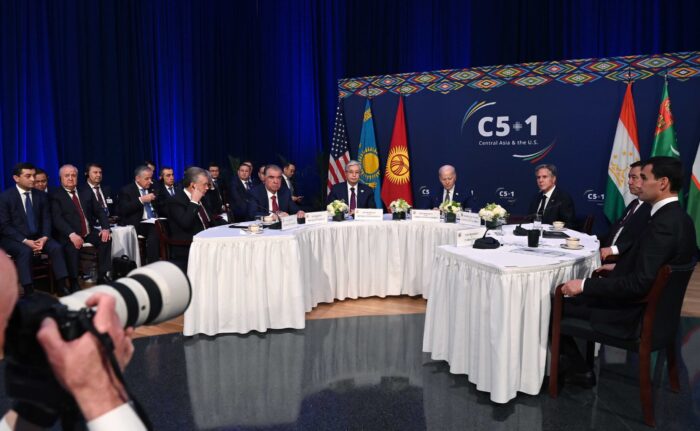ASTANA — The U.S. Department of State hosted on Feb. 8 the inaugural meeting of the C5+1 Critical Minerals Dialogue (CMD) to increase the region’s involvement in global critical minerals supply chains, strengthen economic cooperation, and advance the clean energy transition while also protecting Central Asia’s unique ecosystems, reported the U.S. Department of State press service on Feb. 9.

The inaugural C5+1 presidential summit on Sept. 19 in New York. Photo credit: Akorda.
CMD is an initiative announced by U.S. President Joe Biden and Kazakh President Kassym-Jomart Tokayev, Kyrgyz Republic President Sadyr Zhaparov, Tajikistan President Emomali Rahmon, Turkmenistan President Serdar Berdymukhamedov, and Uzbekistan President Shavkat Mirziyoyev at the C5+1 Presidential Summit in New York on Sept. 19.
The C5+1 diplomatic platform began in 2015 to enhance Central Asia – U.S. dialogue and cooperation.
Under Secretary for Economic Growth, Energy, and the Environment Jose W. Fernandez chaired the C5+1 discussion on the goals and objectives of the CMD.
Assistant Secretary of State for Energy Resources Geoffrey Pyatt moderated the event, accompanied by Deputy Assistant Secretary of State for Central Asian Affairs John Mark Pommersheim and colleagues from across the U.S. government who work on critical minerals. Senior officials from Central Asian governments shared their interest in developing investment opportunities in essential minerals that meet the highest environmental and social standards and governance.
“In the spirit of C5+1 collaboration, each country underscored the benefit of working together to advance the shared critical minerals objectives including diversification of markets and development of technologies in a manner that will benefit all our citizens. Among the initiatives discussed, the United States emphasized opportunities through the Minerals Security Partnership (MSP) and Partnership for Global Infrastructure and Investment. In the lead-up to the mining and exploration convention in Toronto, Canada, called Prospectors & Developers Association of Canada (PDAC), the United States welcomed input from the C5 countries to promote new partnership and investment opportunities and efforts to continue the dialogue through national coordinators within the C5+1 framework,” the statement reads.
The MSP collaborates with 13 countries and the European Union (EU) to catalyze global public and private investment in responsible critical minerals supply chains.
The MSP considers projects along the full clean energy value chain, from mining, extraction, and secondary recovery to processing and refining and ultimately to recycling. The MSP focuses on the most relevant minerals and metals supply chains for clean energy technologies. These include – but are not limited to – lithium, cobalt, nickel, manganese, graphite, rare earth elements, and copper.
